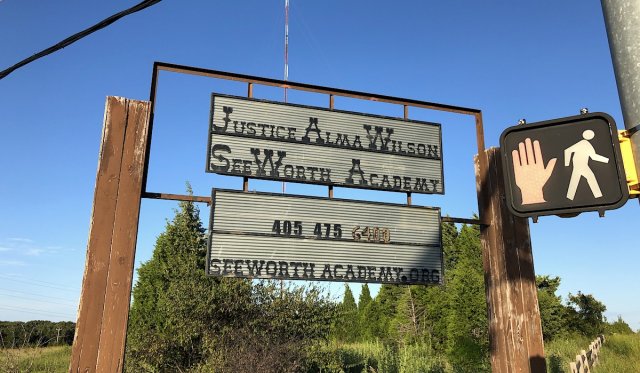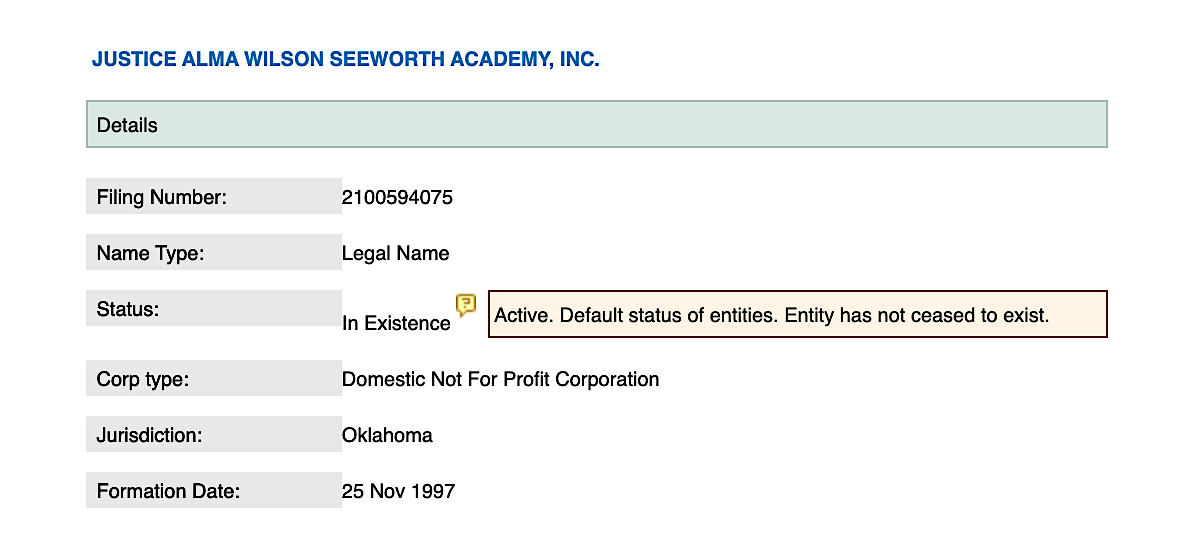

Two terminated employees of the closed charter school Seeworth Academy have filed extensive lawsuits against Seeworth’s corporation, former Superintendent Janet Grigg and six board members, including Oklahoma Court of Civil Appeals Judge Barbara Swinton and Sen. Kay Floyd (D-OKC).
In separate filings, plaintiffs Sharilynn Rodgers and Tarrence Rodgers, who are married, sued the school and varying groups of board members for multiple causes of action. Those claims include negligence, wrongful termination and violations of First Amendment rights, civil rights, the Oklahoma Open Meeting Act and whistleblower protections.
The suits deal with alleged incidents that culminated in the Rodgers’ dismissal in the late spring of 2019 after Sharilynn submitted a whistleblower’s complaint to Swinton, the school’s board chairwoman at the time. In the letter, Rodgers alleged mismanagement of money at the school, including possible misuse of funds in what the school called its corporate account.
The Justice Alma Wilson Seeworth Academy was founded in 1998 and focused on serving at-risk youth who had come into contact with the juvenile justice system.
The school’s charter was dissolved in June 2019, and control of school property and students was handed over to Oklahoma City Public Schools, which eventually had to sue Seeworth to obtain the school’s documents and property.
The charter dissolution came after a May 2, 2019, letter from State Superintendent of Public Instruction Joy Hofmeister to Seeworth’s superintendent, Janet Grigg, outlining the results of an Oklahoma State Department of Education review of the school. According to the letter, the review found that the school had committed “gross neglect and non-compliance with both state and federal laws and regulations.”
An audit of the school by the office of Oklahoma State Auditor and Inspector Cindy Byrd is ongoing, and the two lawsuits were filed in April in U.S. District Court for the Western District of Oklahoma.
Lawyers for Seeworth Academy filed a motion to dismiss the Tarrence Rodgers case April 28, contending that Seeworth ceased to exist on June 30, 2019, and that its assets and liabilities were transferred to OKCPS. The motion argues OKCPS is therefore an indispensable party not named as a defendant and that the suit should be dismissed due to court rules.
Seeworth’s attorney, Joe White, wrote in the motion to dismiss that when OKCPS took possession of the school’s assets, the Seeworth board of directors no longer had legal authority to act. The assets and liabilities were transferred by an order of Oklahoma County District Judge Cindy Truong on Sept. 4, 2019.
White stated the Seeworth board is powerless to defend the lawsuit and that OKCPS, not Seeworth Academy, has possession of documents that could be used to defend the case.
A response has yet to be filed in Sharilynn Rodgers’ lawsuit.
‘She was in fear of retaliatory actions’
According to her complaint, Sharilynn Rodgers was working as a consultant at Seeworth, with a salary of $56,000, at the time of her dismissal. She was concurrently enrolled in a graduate program and doing work as an intern at the school, with Janet Grigg as her mentor. (NonDoc was unable to reach Grigg for comment.)
Rodgers’ schoolwork required her to “gather and review various budgetary and other financial records, and other items considered public record documents,” the complaint says. It was in the course of this work that she began noticing financial irregularities, according to the suit.
The filing also claims Sharilynn Rodgers found the school had failed to report revenue, and it says she learned from conversations with employees that cash intake from school events was routinely not recorded.
The complaint states that “Seeworth had no chief financial officer or [human resources] director/department outside of Grigg.”
On March 4, 2019, Rodgers raised her concerns in an email to Barbara Swinton, the Seeworth board chairwoman. The email also stated that Sharilynn Rodgers feared retaliation and wished to invoke protections under the Oklahoma Whistleblower Act.
Asked to comment on the lawsuits this week, Swinton declined.
“Because it is ongoing litigation, it would not be appropriate to comment,” Swinton said.
Sharilynn Rodgers’ complaint says Swinton replied to her email “simply stating Plaintiff should not have any concerns that the funds were being mishandled.” It also says Rodgers believes Swinton sent a copy of the complaint to Grigg, “despite the fact that plaintiff made clear in her letter that she was in fear of retaliatory actions.”
The lawsuit goes on to detail various forms of alleged retaliation, saying that Grigg stopped communicating with Rodgers, “attempted to humiliate plaintiff, making various remarks about certain personal matters” and “began treating plaintiff’s husband, the then-High School Site Principal, as an outcast and telling staff that plaintiff and her husband were trying to ‘take over the school.'”
Tarrence Rodgers’ complaint echoes his wife’s charges regarding retaliation for her whistleblowing, saying Grigg began excluding him from meetings and school activities, changed the lock on a supply closet in his office and “told plaintiff’s wife and staff that he engaged in alleged personal indiscretions.”
Sharilynn Rodgers was dismissed “on or about April 9,” according to her complaint, which also states that she hasn’t been paid money she was owed at the time of the dismissal. Tarrence Rodgers’ complaint states he wrote a letter to the board on April 23, 2019, saying he believed he was being retaliated against because of his wife, but no action was taken. He was dismissed a few weeks later, on May 17.
According to the lawsuits, both of the Rodgers had worked at Seeworth since 2002. Sharilynn Rodgers previously told NonDoc that Swinton had officiated the couple’s wedding.
Concerns dated back further
Tarrence Rodgers’ lawsuit also makes allegations of discrimination going back to 2017. In one allegation, he says he asked to move from a 12-month contract at the school to a nine-month contract “explaining that his medical conditions were exacerbated by the manual work he was charged with during the summer.” Although reasonable accommodation for medical disability is required by law, the complaint says Grigg refused and “told plaintiff that he should apply for partial disability, to cover part of his pay, but which would require plaintiff to remain working 12 months, full-time (i.e., directing him to commit insurance fraud).”
In their complaints, the Rodgers say they approached board member Greg Dewey in late 2017 to voice concerns about the school’s finances and about Grigg working on campus only “one to two partial days per week.” According to the lawsuits, Dewey raised the matter with the board, but no action was taken.
RELATED
Whistleblower letter, booting of board member raise Seeworth Academy oversight concerns by Tres Savage
As NonDoc previously reported, Dewey sent an email to his fellow board members on April 4, 2019, asking questions about the school’s financial oversight and expressing frustration that he heard about Sharilynn Rodgers’ whistleblower letter to Swinton from “a non-board member” and only after the judge had replied to Rodgers, assuring her that the board’s accountants had reviewed the situation and that she “should not have any concerns that the funds are being mishandled.”
Dewey was removed from the board in an abrupt vote during a special meeting 18 days after he had sent his email. Asked about Dewey’s removal in September, Swinton told NonDoc the board had received allegations “that confidential information had been disclosed.”
Dewey expressed surprise to hear that explanation.
“That is the first I have heard anything about confidential information,” Dewey said. “I was read a bylaw out of our bylaws that said that I could be removed if I no longer had the students’ best interest at heart. I thought I did have that, but that was the only reason offered up.”
Floyd did not attend the April 22 meeting where Dewey was voted off the board and said in September that she did not recall the circumstances.
‘A history of financial malfeasance’ alleged

Both lawsuits charge that Grigg “had a history of financial malfeasance” and that the board was aware of it.
The complaints mention a lawsuit brought in 2012 by former principal Mongo Allen alleging racial discrimination and accusing Grigg of taking the school’s funds “for personal use.” Allen’s lawsuit claimed Grigg had asked him to destroy financial records. That lawsuit was settled with an agreement of confidentiality.
In the Rodgers’ new lawsuits, the actions list defendants as the school corporation — which maintains an “active” status on the Secretary of State website — Grigg and six board members: Swinton, Floyd, Patricia Kelley, Beverley Patchell, John Mayfield and Lee Anne Wilson.
Floyd, who serves as minority leader in the Oklahoma State Senate, is not listed as a defendant on the counts directly related to the decision to fire the Rodgers, though both complaints earlier list her among those who “collectively made the decision to terminate plaintiff’s contract.”
Like Swinton, Floyd declined comment for this story. But she previously told NonDoc that she didn’t see Sharilynn Rodgers’ whistleblower letter and was not aware of the circumstances of her termination.
Floyd and Swinton also told NonDoc in September that they had heard Grigg had a gambling problem.
Grigg was dismissed from her position in 2019 before the board dissolved the school.
D.A. waiting for investigation results
In September, the Oklahoma City Police Department confirmed that a police report regarding an allegation of felony embezzlement at Seeworth had been filed. (The filing came a day after NonDoc asked Swinton whether police had been alerted to possible criminal activity.)
The police report states that both the Seeworth board and OKCPD were made aware of potential wrongdoing in April 2019. In September, Oklahoma County District Attorney David Prater said he was “greatly disappointed” that it had taken so long for the police to begin an investigation of the allegations.
Asked about the situation now, Prater said he remains interested.
“The OKCPD has not delivered an investigation to me,” Prater said, adding that he wants to receive an update on the situation from investigating authorities.
Shari Rodgers’ petition
 Loading...
Loading...
Tarrence Rodgers’ petition
 Loading...
Loading...
Seeworth response to Tarrence Rodgers’ petition
